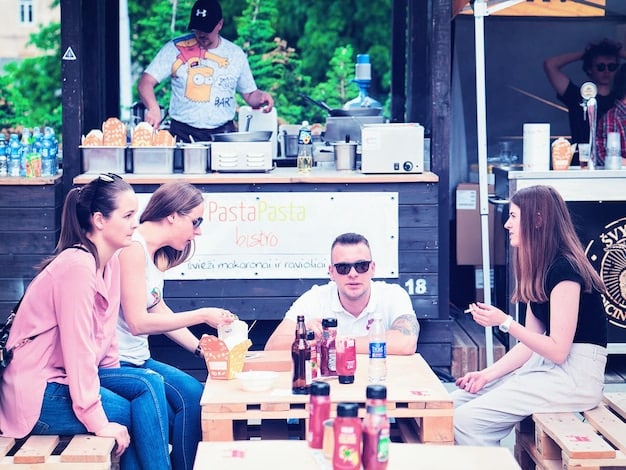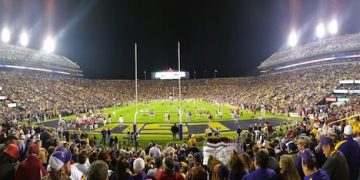MLS Sponsorship Deals: Brands Investing & Why (2024/25)

MLS Sponsorship Deals are increasingly attractive to brands seeking to tap into soccer’s growing popularity in the US, with major investments driven by the league’s expanding fanbase and strategic partnerships.
The landscape of MLS Sponsorship Deals: Which Brands Are Investing and Why? is constantly evolving, reflecting the growth and increasing popularity of soccer in the United States. These sponsorships are more than just logos on jerseys; they represent strategic investments aimed at capturing the attention of a diverse and expanding fan base. Major League Soccer (MLS) has transformed from a niche sport to a mainstream attraction, drawing significant interest from brands across various sectors.
Understanding the MLS Sponsorship Landscape
The ever-changing landscape of MLS sponsorships shows the league’s greater influence and appeal to a wide array of companies. These partnerships go beyond basic advertising, becoming woven into the experience of the fan and the brand identity.
Key Trends in MLS Sponsorships
MLS sponsorships are influenced by a number of important trends, including technology breakthroughs, shifting demographics, and growing fan engagement. Understanding these trends is essential for analyzing the strategy of brands investing in the league.
- Technological Integration: Brands are increasingly leveraging technology to enhance fan experiences and engagement through innovative activations at stadiums and digital platforms.
- Demographic Shifts: The growing diversity of MLS fans is attracting brands looking to connect with specific cultural and ethnic groups.
- Fan Engagement Strategies: Sponsors are focusing on creating interactive and immersive experiences to build stronger relationships with fans.
The use of technology to improve fan experiences, like virtual reality experiences and interactive stadium activities, is becoming more common. Additionally, sponsors are now customizing their strategies to connect with the wide-ranging demographics that comprise the MLS fanbase, showing an understanding of the cultural mosaic that characterizes the league.

Major Brands Investing in MLS
Several well-known companies are investing significantly in the MLS, attracted by the league’s rising profile and committed following. Examining these brands—their origins, objectives, and strategies—reveals important insights into the dynamics of MLS sponsorships.
Adidas: A Long-Standing Partnership
Adidas has been a major player in soccer sponsorships worldwide, and their partnership with MLS is a long-standing and strategic alliance. As the official apparel provider for the league, Adidas has a strong presence on and off the field.
Adidas’ association with MLS boosts its brand awareness and enables it to connect with soccer lovers on a deep level, in addition to providing uniforms and equipment. This partnership exemplifies the potential of enduring sponsorship agreements in sports.
Coca-Cola: Refreshing the Fan Experience
Coca-Cola, a global beverage giant, has also made substantial investments in MLS, focusing on refreshing the fan experience both in stadiums and at home. Through various marketing initiatives and promotions, Coca-Cola aims to enhance game-day experiences.
- Stadium Activations: Coca-Cola creates engaging activations at MLS stadiums, offering fans interactive experiences and promotional giveaways.
- Community Engagement: The brand supports local communities through soccer-related initiatives, strengthening its connection with fans.
- Digital Campaigns: Coca-Cola leverages digital platforms to reach a wider audience and promote its involvement with MLS.
Through collaborations with MLS teams and the league itself, Coca-Cola is able to capitalize on soccer’s extensive reach. By aligning with soccer, Coca-Cola connects with a vibrant and expanding demographic, which promotes brand loyalty and enhances experiences for spectators and people watching from their homes.

Why Brands Are Investing in MLS
For brands, the MLS offers an appealing venue to reach a varied and rapidly expanding audience. Several factors, including the league’s increasing popularity, favorable demographics, and possibilities for fan engagement, are driving this investment.
MLS’s Rising Popularity and Reach
The surge in interest in soccer in the United States, fueled by MLS, has resulted in higher attendance rates, television ratings, and social media engagement. Consequently, companies may broaden their reach and connect with a sizable and involved audience by partnering with the league.
With soccer becoming more and more well-liked, brands are using MLS to reach a larger range of people, especially young people and multicultural communities, which is helping them grow their consumer base and market presence.
Demographic Advantages of MLS Fans
MLS fans represent a wide range of ethnicities, ages, and socioeconomic backgrounds, making them an appealing market for businesses looking to connect with particular consumer groups. These firms may customize their marketing activities and have a greater influence on their target market by understanding the demographics of MLS fans.
MLS’s widespread appeal across different populations makes it a great platform for companies looking to forge genuine connections with their clientele by customizing their messaging and campaigns to reflect the diverse array of ethnicities and interests within the fanbase.
The Impact of Sponsorships on MLS Teams
Sponsorships are essential for MLS teams because they offer capital to help with player development, stadium improvements, and community outreach. These alliances improve game-day experiences in addition to impacting team finances.
Financial Benefits for MLS Teams
Revenue from sponsorships helps MLS teams meet operating costs, pay for players, and upgrade facilities. This investment helps the league remain competitive and sustainable over the long haul.
Financial stability made possible by sponsorships allows clubs to field respectable teams, draw in top talent, and provide cutting-edge facilities, all of which improve both the experience of the fan and the team’s performance generally.
Enhancing Fan Engagement Through Sponsorships
Sponsors and MLS teams may work together to improve the fan experience by providing exclusive contests, stadium improvements, and digital activations. These initiatives provide value for both fans and sponsors while also developing a stronger feeling of community and loyalty.
By means of experiences that are both technologically advanced and involve fans in a meaningful way, sponsorships play a key role in making MLS games more participatory and fun for everyone.
Future Trends in MLS Sponsorships
Several trends, including technology activations, data analytics, and changing sponsorship models, are expected to shape the future of MLS sponsorships. These changes present both opportunities and difficulties for businesses and teams.
Technological Innovations in Sponsorship Activations
Brands will continue to explore technology to improve fan experiences, from augmented reality experiences to interactive stadium displays. These improvements will make sponsorships more interesting and memorable for fans.
By implementing AI-driven experiences and immersive technologies, MLS is positioned to lead the way in establishing standards for fan participation in the rapidly changing realm of sports sponsorship, hence enhancing the whole experience in the stadium.
Data Analytics and Targeted Marketing
Brands may customize their marketing activities and achieve better sponsorship results by using data analytics to better understand fan preferences. This data-driven approach helps companies in maximizing their return on investment and creating focused messaging.
Brand collaborations will become more personalized and effective as MLS teams implement complex data analytics to better understand the preferences of their fans, leading to marketing campaigns that promote greater interaction and brand loyalty among supporters by speaking directly to their interests and requirements.
Case Studies: Successful MLS Sponsorship Deals
Examining specific MLS sponsorship deals reveals how businesses and teams may collaborate to produce mutually beneficial results. These case studies emphasize the value of innovation, teamwork, and mutual alignment in achieving sponsorship success.
BMO and Toronto FC: A Deep Community Connection
The partnership between BMO (Bank of Montreal) and Toronto FC exemplifies how a sponsorship can foster a deep connection with the community. BMO’s involvement extends beyond stadium branding to support youth soccer programs and community initiatives.
- Youth Soccer Programs: BMO supports grassroots soccer programs, providing opportunities for young players to develop their skills and passion for the game.
- Community Initiatives: The bank actively participates in community events and initiatives, strengthening its ties with Toronto FC fans and the broader community.
- Stadium Branding: BMO Field, the home of Toronto FC, prominently features the BMO brand, reinforcing the bank’s commitment to the team and its fans.
By putting money into neighborhood projects and youth sports, the relationship between BMO and Toronto FC illustrates how a sponsorship can go beyond marketing reach to become a tangible factor in the community’s well-being. This strategy improves the bank’s standing with fans and members of the community by showing a dedication to soccer and community development.
Audi and MLS: Driving Innovation and Engagement
Audi’s partnership with MLS showcases the brand’s focus on innovation and fan engagement. Through various initiatives, Audi aims to enhance the match-day experience and connect with soccer fans on a personal level.
The dedication of Audi to improving the match-day experience via cutting-edge activities highlights the significance of developing a genuine connection with soccer supporters, consequently solidifying Audi’s standing as a top MLS sponsor and showcasing its commitment to innovation.
| Key Point | Brief Description |
|---|---|
| ⚽ Growing Popularity | MLS is gaining traction, attracting more fans and brands. |
| 🤝 Strategic Partnerships | Brands invest to connect with diverse MLS fanbase. |
| 📱 Tech Integration | Use of tech enhances fan experience and engagement. |
| 💰 Financial Boost | Sponsorships aid team development and community reach. |
Frequently Asked Questions
Brands invest in MLS sponsorships to tap into soccer’s rising popularity in the U.S., connect with a diverse fan base, and enhance brand visibility through stadium advertising and fan engagement activities.
Typical sponsors include beverage companies, automotive brands, apparel providers, financial institutions, and technology firms, all aiming to reach a broad and engaged audience through MLS.
Sponsorships provide MLS teams with essential financial resources for player development, stadium improvements, and community outreach programs, enhancing team competitiveness and fan experiences.
Innovative activations include augmented reality fan experiences, interactive stadium displays, and digital campaigns that enhance fan engagement and create memorable brand interactions during games.
Future trends include greater use of data analytics for targeted marketing, more technology-driven fan experiences, and evolving sponsorship models that emphasize deeper community connections and brand integration.
Conclusion
In conclusion, MLS sponsorship deals are a dynamic and evolving landscape, attracting significant investments from brands seeking to capitalize on soccer’s growing popularity in the US. These sponsorships provide financial benefits to teams, enhance fan engagement, and offer brands a unique opportunity to connect with a diverse and passionate audience, setting the stage for continued growth and innovation in the years to come.





